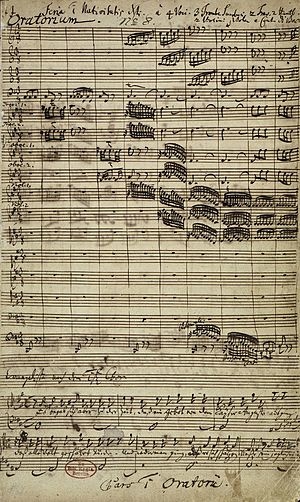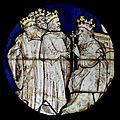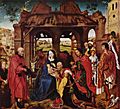Christmas Oratorio facts for kids
The Christmas Oratorio (German: Weihnachts-Oratorium) is a musical composition written by Johann Sebastian Bach. It tells the story of the birth of Jesus, based on the gospels of Matthew and Luke.
Contents
History
Before Bach wrote the Christmas Oratorio, he already wrote some cantatas for the Christmas season. The oratorio was written in 1734. It was written for the Christmas season of that year. It was first performed in the Thomaskirche and Nikolaikirche, Leipzig.
Music
The oratorio has 6 parts. Each part is performed for a certain day in the Christmas season. Some of the music is based from Bach's other works.
Chorales
In his German-language church music, Bach uses Lutheran chorale melodies.
Parts
Part I
Part I is written for Christmas Day (December 25). The words tell the story of the birth of Jesus. The instruments used in part I are 3 trumpets, timpani, 2 flutes, 2 oboes (each player also plays an oboe d'amore), 2 violins, viola, and the basso continuo.
Part II
Part II is written for the second day of Christmas (December 26). The instruments used in part II are 2 flutes, 2 oboes d'amore, 2 oboes da caccia, 2 violins, viola, and the basso continuo.
Part III
Part III is written for the third day of Christmas (December 27).
The instruments used in part III are the same as part I.
Part IV
Part IV is written for New Year's Day (January 1).
The instruments used in part II are 2 horns, 2 oboes, 2 violins, viola, and the basso continuo.
Part V
Part V is written for the Sunday after New Year's Day.
The instruments used in part II are 2 oboes d'amore, 2 violins, viola, and the basso continuo.
Part VI
Part VI is written for the holiday of Epiphany.
The instruments used in part VI are the same as part I.
Images for kids
-
Georges de La Tour: Adoration of the Shepherds (1644)
-
Giotto: Angels at the Nativity (c. 1300)
-
Rogier van der Weyden: Adoration of the Magi (c. 1430–60)
See also
 In Spanish: Oratorio de Navidad para niños
In Spanish: Oratorio de Navidad para niños











